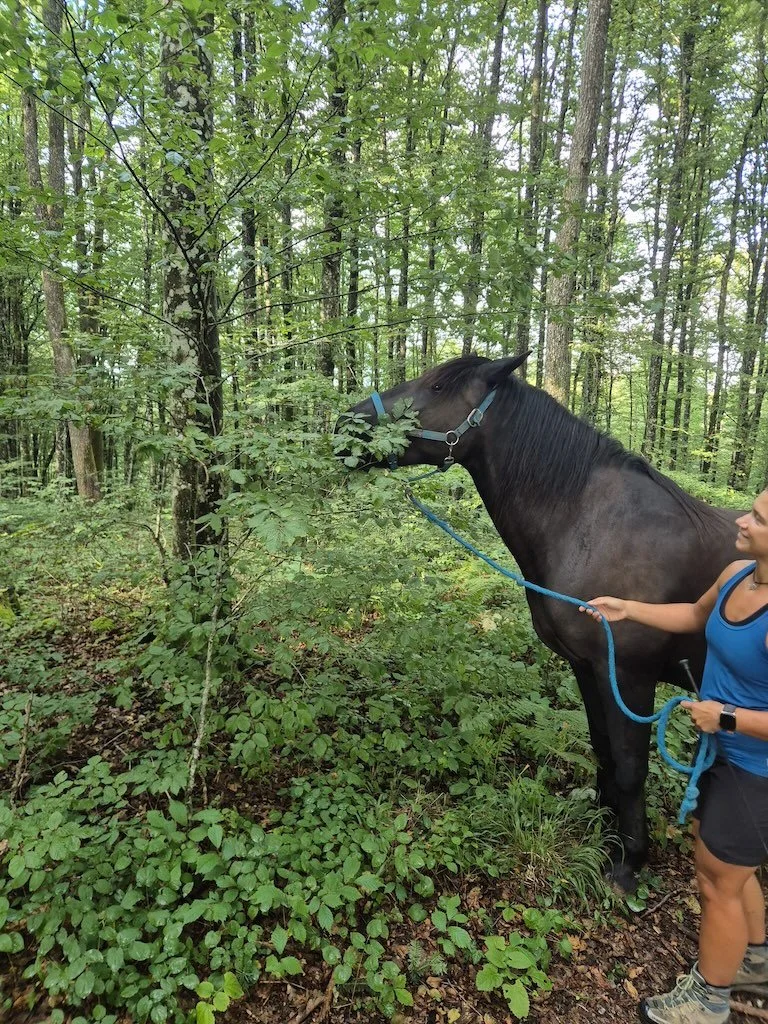Whatever problem you're fixing – consider diet too
Diet has a huge impact on overall health. When dealing with any kind of health issue, make sure you consider changes in diet too.
Foraging trips can be a great way to offer some diversity in the diet.
You are what you eat. Lately I keep coming back to this phrase and marvelling at its fundamental truth. It's true in a very literal sense – your body takes building blocks from food to make muscle, skin, hair... But it's also true in a physiological sense – the quality of the fuel that you give your body determines how well your body systems will run. Recent (and not so recent) research has shown just how big an impact the gut microbiome has on pretty much everything in our bodies. Skin allergies? Diet can help. Tiredness and brain fog? Diet can help. Muscle aches and digestive issues? Diet can help.
There is not quite as much research done on the effects of the gut microbiome on the body in horses, but since we are very similar creatures it's not a big stretch to assume its impact is pretty big. In fact, one can argue that since horses are non-ruminant herbivores and thus use two different digestive systems (enzymatic digestion and microbial fermentation), the health of their digestive tract is even more important for overall health.
Humans like to compartmentalize things because it makes it easier to understand complex subjects. But sometimes this can make us narrow minded as well. When we are dealing with a problem with our horse – be it a performance issue, recurring infections, breathing problems, skin issues or even behavioural problems – we tend to look at it in isolation. And yes, of course it's important to zero in on the problem, but let's not forget there are things on the periphery that we should consider too. One thing I think we should always consider is the diet. Whatever problems we are dealing with, making sure our horse's gut microbiome is as healthy as it can be, will help.
Balancing the diet can be a tricky subject and often when we are stuck, we need to seek our help from an equine nutritionist. But, the basics should be pretty straightforward. We need to make sure the basis of our horse's diet is good quality forage, which should be fed either 24/7 or in regular intervals, depending on what our horse needs. This should be supplemented by a vitamin and mineral balancer, which should ideally complement the forage we are feeding. We should only add high energy cereals and feeds if our horse needs them. Here's where the nutritionist comes in again. We are well aware that we should avoid processed foods like potato chips and cookies, and we should keep the same in mind for our horses. Minimize feeds that are high in sugars and starch.
One thing that seems to be a problem in modern horses is a lack of diversity. The hay we feed lacks a wide variety of different plants, which can make our horse's diets pretty monotonous. We know from human research that diversity is great for the gut microbiome. The same (most likely) goes for horses. Finding a way to enable your horse to have access to a wide array of plants can be very beneficial. This can be done by offering different herbs and plants (obviously, make sure they are safe for horses to eat) or by going on foraging trips. Taking your horse for a walk in the country side with the purpose of letting him nibble on different plants can be both healthy and fun. These are just some simple things to consider. The subject of proper equine nutrition is a very complex one and it's easy to get lost in it. My main advice to you this week is this. If you are struggling with a health issue with your horse, contact an equine nutritionist (not a sales rep, but an independent nutritionist) and get advice on what you can do to support the horse's digestive system. Ask about herbs, spices and other plants you can offer to help support the body. Trust me, it will make a big difference. Remember, you are what you eat.
